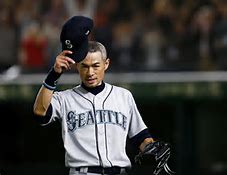Podcast: Play in new window | Download
Subscribe: RSS
Quick. Name some of sports’ most legendary players who are known by just one name.
Hoops? Let’s go for Magic, Shaq and Kobe.
Golf? There’s always Arnie, Tiger, and Jack.
What about baseball, you ask? Willie, Mickey, and the Duke would make for a nice song!
Let’s consider adding the name “Ichiro” to that baseball list!
Ichiro Suzuki (known to the world as simply “Ichiro”) quietly retired last week at the age of 45 from the Seattle Mariners. The M’s and the Oakland A’s were playing Major League Baseball’s season-opening two-game series in Tokyo late last week.
Ichiro started his lengthy (28 years!) professional baseball career in Japan as he became national legend in his first nine seasons. While in Japan, Ichiro batted .353 and won seven Gold Glove awards for his skills as a speedy outfielder with an accurate throwing arm.
During the 1994 baseball season, he began to use his given name, “Ichiro,” instead of his family name of “Suzuki” on the back of his uniform. The team’s manager introduced that idea as a publicity move to help create a way to distinguish their rising young star.
Initially, Ichiro did not agree with the name change and was reportedly embarrassed by it. By the end of the season, though, “Ichiro” had become a household name in Japan and, soon, around the world.
He came to the United States to play in Major League Baseball with Seattle in 2001. Many Americans thought Ichiro might be too frail to succeed against Major League pitching or endure the longer 162-game season.
After all, Major League Baseball fans had become used seeing steroid-induced giants such as Mark McGwire and Barry Bonds on the field for the past decade.
Ichiro was smaller than most major leaguers. Despite his “average” height and weight (listed as 5’11” and 170 pounds), Ichiro’s inaugural season in Seattle featured a sterling .350 batting average and 56 stolen bases.
He became the first player to lead the league in both categories since Jackie Robinson in 1949. Ichiro also won the American League’s MVP and Rookie-of-the-Year awards.
As fans flocked to watch Ichiro, his on-field stretching exercises started to become legendary.
“Ichiro’s on-deck gyrations became a Seattle model of cool,” wrote S.L. Price of Sports Illustrated in 2002, “with Little Leaguers everywhere trying to keep their faces blank while contorting like pretzels.”
During his first ten MLB seasons in Seattle, Ichiro was selected to the All-Star team every season as he also had more than 200 hits each year (an American League Record). He also holds an American League record with 45 consecutive stolen bases without being caught between 2006 and 2007.
Ichiro’s personal stats started to slide after he turned 40 years old (5 years ago!) as he traveled to play for the New York Yankees and Miami Marlins. He came back to finish his major league career in Seattle last week with a .311 career batting average and finished 22nd on the MLB all-time hits list with 3,089.
And that came AFTER he played his first nine years in Japan!
Ichiro Suzuki opened the door for the next generation of Japanese players as many MLB teams now feature former Japanese stars on their rosters.
The Seattle Mariners have added another Japanese league star to their roster this season. Left-handed pitcher Yusei Kikuchi was handed the ball to start on the mound for Ichiro’s final baseball game last week in Tokyo.
Kikuchi is getting a chance to live two dreams – playing in Major League Baseball and being a teammate to his boyhood idol.
At Kikuchi’s introductory press conference in Seattle, he referred to Ichiro as “a person in the sky, a legend. I don’t know if he really exists,” in deference to his new teammate’s nearly mythical status in Japan.
When Ichiro was lifted from the game in the eighth inning, he was hugged by all of his teammates one by one, but the tears streaming down the face from Japanese teammate Yusei Kikuchi signified how many Japanese fans felt about their long-time hero.
As Ichiro came back to his home country in Japan last week to say a final “Sayonara” to the game of baseball, his legendary work ethic and professionalism have set new standards for future generations of baseball players.
Well done, Ichiro!

